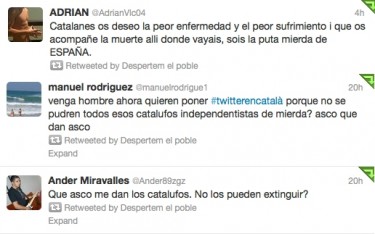#TwitterEnCatalà Provokes Tweets of Joy and Hate
 This post also available in:
This post also available in:
Many Twitter users have rejoiced in the website's newest language edition, but many others have expressed their anger at the announcement, tweeting derogatory remarks about the Catalan language and people.
On the positive side, many directly thanked Albert Cuesta, who organized the public petition for a Catalan Twitter, as well as all those who signed it:
@csolaniubo: Avui és el dia que hem de felicitar l' @albertcuesta per ser tant tossut i fer que entre tots hàgim aconseguit el #twitterencatala Gràcies!
@csolaniubo: Today is the day we congratulate @albertcuesta for his resolve & for getting us #twitterencatala Thank you!
@jordiipa: El meu #FF és per als 7.383 signants de la petició i els 5.000 voluntaris que han traduït #twitterencatala < i el meu x @albertcuesta grcs!
@jordiipa: My #FF is for the 7,383 people who signed the petition & the 5,000 volunteers who translated #twitterencatala < thank you @albertcuesta!
There were also abundant tweets that celebrated the launch of Catalan
Twitter as a victory for Catalan identity in the context of Catalonia's
current sociopolitical situation:@sonrisadecolor: M'encanta tenir el #Twitter de l'ordinador en #català. Només una mica més i ja tindrem la #IndepedènciaperCatalunya! #twitterencatala
@sonrisadecolor: I love having #Twitter in #Catalan. Soon enough we'll have #IndependenceforCatalonia! #twitterencatala
@quimtorra: Això del #twitterencatala és com ens passarà l'endemà de la independència: semblarà mentida que no hagués estat sempre així.
@quimtorra: #twitterencatala feels just like independence will: we'll wonder why it wasn't always so.
That being said, Catalan Twitter's launch also provoked a storm of
angry, in some cases racist tweets towards the Catalan language and
people, and conversely, some vitriolic, as well as sarcastic, responses:@xaviconde: Los que están detrás de #twitterencatala quieren partir España. Además de ducharse poco, claro.
@xaviconde: The people behind #twitterencatala want to partition Spain. Aside from opting not to bathe, of course.
@juanjo_R_G: #twitterencatala Eso, eso, y yo quiero la versión en panocho, bable, andaluz y latín antiguo.
@juanjo_R_G: #twitterencatala Terrific! Now we just need Twitter in Panocho, Bable, Andalusian and ancient Latin.
@somosloslocos: Ahora Twitter parecerá un huerto, todos hablando como si tuvieran un nabo en la boca. #twitterencatala
@somosloslocos: Twitter will seem like an orchard, everyone talking like they've got a turnip in their mouth. #twitterencatala
@mapumo21: La ràbia dels espanyols és directament proporcional a les meues ganes de parlar, escriure i pensar en català! #twitterencatala #adeuespanya
@mapumo21: Spanish insanity is directly proportional to my desire to speak, write and think in Catalan! #twitterencatala #adeuespanya (#goodbyeSpain)
@el_bocazas: Que los catalanes tengan #twitterencatala m parece tan reprobable como que los rusos tengan #twitterenruso o los franceses #twitterenfrancés
@el_bocazas: Catalans having #twitterencatala bothers me as much as Russians having #twitterinrussian or the French #twitterinfrench
@Maltlatadol: tt #twitterencatala y la peña rajando. Jajajajaja maldita envidia. A min só me molesta que non hai #twitterengalego
@Maltlatadol: #twitterencatala everyone's up in arms, but I'm just jealous. It only bothers me that we still don't have #twitterengalego (#twitterinGalician)
-----------------------
The website Apuntem.cat,
dedicated to denouncing anti-Catalan racism on the Internet, collected
some of the most violent tweets (note: in Spanish, “catalufo” is used as
a slur for Catalans):
Catalan Twitter was launched less than a week after the Centre d'Estudis d'Opinió's latest public opinion poll [cat], which highlighted that over 51% of the Catalan electorate would vote in favor of independence if a referendum were held tomorrow.
Written by Violeta Camarasa · Translated by udell.db
@AdrianVic04: Catalans, I wish you the worst illness and suffering,
and that death follows you through life, you are the fucking shit of
SPAIN.
@manuelrodrigue1: come on, man now that want to put #twitterencatalà, when will these piece-of-shit separatist catalufos quit? they're just disgusting
@Ander89zgz: These catalufos disgust me. Can't we just exterminate them all?
Violently anti-Catalan tweets have worried Catalan netizens for a long time. European MP Ramon Tremosa
has brought these concerns before the European Commission, arguing that
these kind of statements shouldn't be protected as free speech because
they “carry the seed of hate“ [cat].@manuelrodrigue1: come on, man now that want to put #twitterencatalà, when will these piece-of-shit separatist catalufos quit? they're just disgusting
@Ander89zgz: These catalufos disgust me. Can't we just exterminate them all?
Catalan Twitter was launched less than a week after the Centre d'Estudis d'Opinió's latest public opinion poll [cat], which highlighted that over 51% of the Catalan electorate would vote in favor of independence if a referendum were held tomorrow.
Written by Violeta Camarasa · Translated by udell.db














